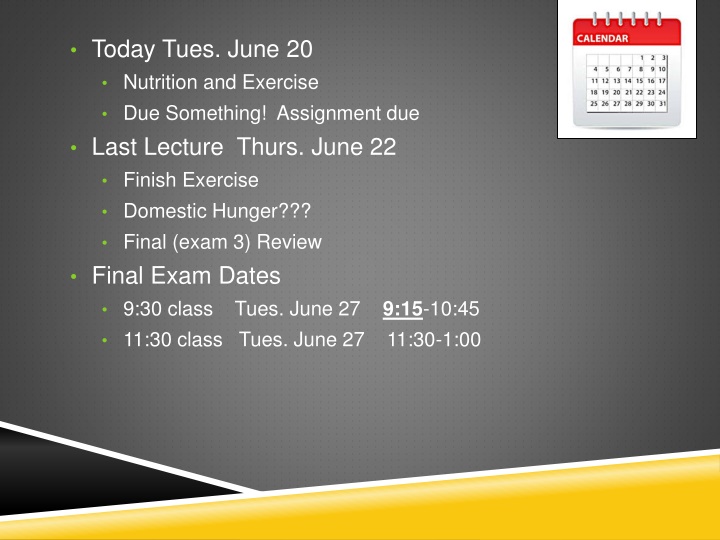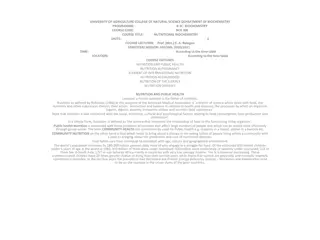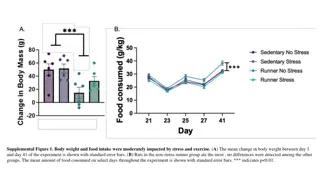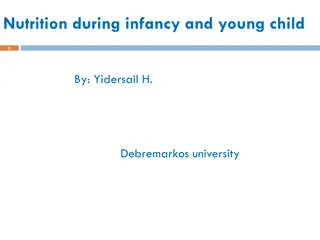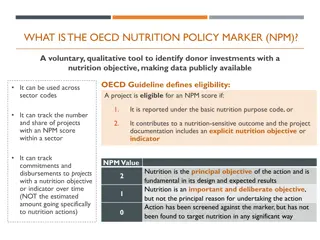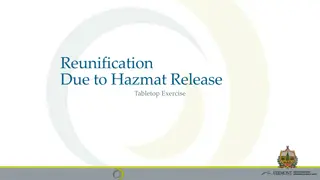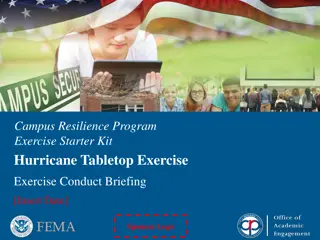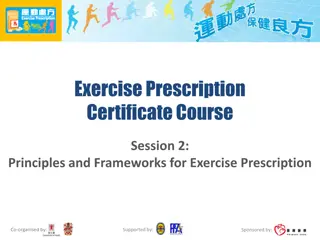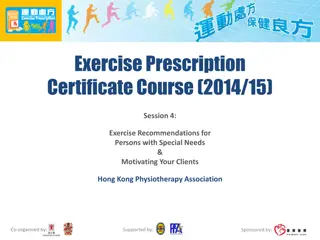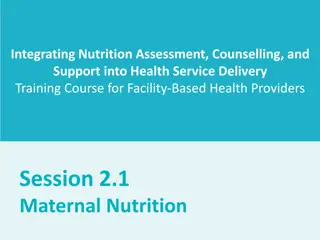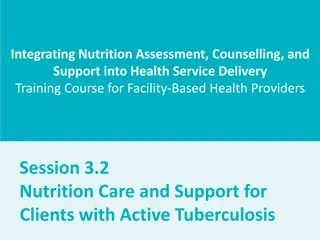Importance of Nutrition and Exercise for Optimal Performance
Learn about the key role of nutrition and exercise in achieving optimal performance. Discover the significance of consuming essential fuels, the benefits of hydration, and why exercise is crucial for reducing disease risks, improving mood, and enhancing overall well-being.
Download Presentation

Please find below an Image/Link to download the presentation.
The content on the website is provided AS IS for your information and personal use only. It may not be sold, licensed, or shared on other websites without obtaining consent from the author.If you encounter any issues during the download, it is possible that the publisher has removed the file from their server.
You are allowed to download the files provided on this website for personal or commercial use, subject to the condition that they are used lawfully. All files are the property of their respective owners.
The content on the website is provided AS IS for your information and personal use only. It may not be sold, licensed, or shared on other websites without obtaining consent from the author.
E N D
Presentation Transcript
Today Tues. June 20 Nutrition and Exercise Due Something! Assignment due Last Lecture Thurs. June 22 Finish Exercise Domestic Hunger??? Final (exam 3) Review Final Exam Dates 9:30 class Tues. June 27 9:15-10:45 11:30 class Tues. June 27 11:30-1:00
Please work alone. On the card provided, print your last name, first name and class time and answer questions. 1. Name the 4 fuels we consume (only 3 are essential). Which 2 are the main fuels for muscle work? Why are the other 2 fuels NOT preferred for muscle work? 2. Excess of any fuel is stored as what?
EAT WISE TO EXERCISE Nutrition & Exercise Recreational ~1 hour/day Objective: To teach the nutrition basics required for optimal performance.
WHATS SO GREAT ABOUT EXERCISE? Reduce risk for many diseases Improve mood Lower risk of dementia Reduce stress Improve strength/flexibility Minimizes lean mass loss when losing weight Fun!
NUTRITION CONCERNS FOR THE PHYSICALLY ACTIVE WATER LYTES FUEL
#1 PRIORITY FLUIDS !
WHY IS WATER SO IMPORTANT? Maintain: Blood volume Muscle structure function Cooling system How much fluid needed? Goal: urine frequent and clear Need varies with size, temp, load, fitness, etc. ~ half your weight in ounces
HOW-WHY CALCULATE SWEAT RATE?? HOW? (Pre workout weight post weight) + fluids taken during workout (e.g. 16 oz. water) = wt. change during workout. Divide by minutes exercised = fluid loss/min. WHY? Tells amount of fluid needed to stay hydrated.
WHEN TO HYDRATE? Sip over entire day Hydrate on schedule thirst poor indicator of need Avoid over hydration!
WHAT TO DRINK? Plain ol water ! If >1 hour; add dilute carb If >3-4 hours; add carb and Na+ Avoid alcohol It s a diuretic, poor muscle fuel, dangerous Why?
BATTLE OF THE BEVERAGES? Remember 1 tsp. ~ 4 grams 12 oz. serving Powerade g. sugar 20 carb type HFCS g. protein* 0 LFChocMilk 29 Lactose, HFCS 13 100% OJ 36 0 Natural (fructose+sucrose) Evap Cane Juice Prot. Monster 37 25 Coke 39 HFCS 0
ELECTROLYTES (LYTES) Required: normal muscle function & fluid balance Major lytes: Na+and K+ (2:1 respectively) Sweat rate/composition influences need Best for most salt (NaCl) post-exercise meal Lyte replacer drinks OK, usually not needed Try:1C Greek yogurt + frozen banana + 1C. greens
POTASSIUM (K+) RICH FOODS P O T A T E S A V O C A D O C O C O N U T M U S H R O O M S Y O G U R T C A N T A L O U P E O R A N G E W H E Y P O W D E R J U I C E A L L W A T E R
PRIMARY MUSCLE FUELS-MAKE ATP NOTE: Protein is a poor fuel !!!! Low-moderate intensity, long duration activity Adequate O2 to muscle-aerobic Fatty acids (fat) + glucose = fuel High intensity-short duration activity Inadequate O2 to muscle-anaerobic Glucose = only fuel
BREATHING EASY Aerobic environment O2 available to the cell low intensity, long duration workout (sit, stand, jog) fuel mostly fat + some glucose (minimal, little protein) Goal: stay aerobic at as high intensity as you can Ideal way to decrease excess fat stores Improve heart/lung fitness stay aerobic easier
BREATHING HARD Anaerobic O2 limited Glucose ONLY High intensity short duration workout (sprint)
CARBOHYDRATE Clean, versatile fuel. Body has limited supply Before (1+ hr.) ~complex carbs-low fat During ~usually only need if exercise > ~1hour After~carb (simple or complex) + protein (~3:1)
PROTEIN ~.5 g/lb or ~ half your weight in grams >1g/lb exceeds protein body can assimilate ~30 g protein/meal is upper usable limit for protein synthesis Menu Idea: post workout MiniMeal PBJ + LF Milk
IS THE PALEO DIET THE ANSWER? Impossible to truly eat paleo! You can live on it! Encourages exercise Discourages processed foods Often excess prot. & low calcium Restricts some healthy carbs; e.g. dairy, beans, grain, potatoes
Eat real food. Mostly plants. Not too much. Stay hydrated. Have fun being active! Eat right Sit Less Move More
Join a team Add a thrill Buddy up Dancing counts Do it!
Please work alone. Answer these questions again on the same card you used prior to the lectures on sports-nutrition 1. Name the 4 fuels we consume (only 3 are essential). Which 2 are the main fuels for muscle work? Why are the other 2 fuels NOT preferred for muscle work? 2. Excess of any fuel is stored as what?
